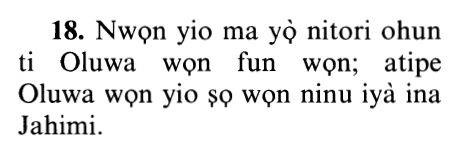52vs18
Select any filter and click on Go! to see results
فَاكِهِينَ بِمَا آتَاهُمْ رَبُّهُمْ وَوَقَاهُمْ رَبُّهُمْ عَذَابَ الْجَحِيمِ
Fakiheena bima atahum rabbuhum wawaqahum rabbuhum AAathaba aljaheemi
Index Terms
Click to play
Yoruba Translation

Hausa Translation
Sunã mãsu jin dãɗi da abin da Ubangijinsu Ya ba su, kuma Ubangijinsu Ya tsãre musu azãbar Jahĩm.
Asbabu n-Nuzuul (Occasions of Revelation)
فَاكِهِينَ بِمَا آتَاهُمْ رَبُّهُمْ ...
Enjoying in that which their Lord has bestowed on them,
meaning, enjoying the various types of delight that Allah has granted them therein, such as various types of foods, drinks, clothes, dwelling places, mounts, and so forth,
... وَوَقَاهُمْ رَبُّهُمْ عَذَابَ الْجَحِيمِ ﴿١٨﴾
and (the fact that) their Lord saved them from the torment of the blazing Fire.
He saved them from the torment of the Fire, which is a bounty itself. Added to this blessing is the fact that they were entered into Paradise, which has delights that no eye has ever seen, no ear has ever heard, nor has a heart ever imagined.
" فاكهين بما آتاهم ربهم " أي يتفكهون بما آتاهم الله من النعيم من أصناف الملاذ من مآكل ومشارب وملابس ومساكن ومراكب وغير ذلك " ووقاهم ربهم عذاب الجحيم " أي وقد نجاهم من عذاب النار وتلك نعمة مستقلة بذاتها على حدتها مع ما أضيف إليها من دخول الجنة التي فيها من السرور ما لا عين رأت ولا أذن سمعت ولا خطر على قلب بشر .
"فاكهين" متلذذين "بما" مصدرية "آتاهم" أعطاهم "ربهم ووقاهم ربهم عذاب الجحيم" عطفا على آتاهم أي بإتيانهم ووقايتهم ويقال لهم :
أي ذوي فاكهة كثيرة ; يقال : رجل فاكه أي ذو فاكهة , كما يقال : لابن وتامر ; أي ذو لبن وتمر ; قال : وغررتني وزعمت أنـ ـك لابن بالصيف تامر أي ذو لبن وتمر . وقرأ الحسن وغيره : " فكهين " بغير ألف ومعناه معجبين ناعمين في قول ابن عباس وغيره ; يقال : فكه الرجل بالكسر فهو فكه إذا كان طيب النفس مزاحا . والفكه أيضا الأشر البطر . وقد مضى في " الدخان " القول في هذا .
I'raab - grammatical analysis of the Qur'an
«فاكِهِينَ» حال منصوبة بالياء «بِما» متعلقان بفاكهين «آتاهُمْ» ماض ومفعوله «رَبُّهُمْ» فاعل مؤخر والجملة صلة ما «وَوَقاهُمْ رَبُّهُمْ» معطوف على آتاهم ربهم «عَذابَ» مفعول به «الْجَحِيمِ» مضاف إليه.
